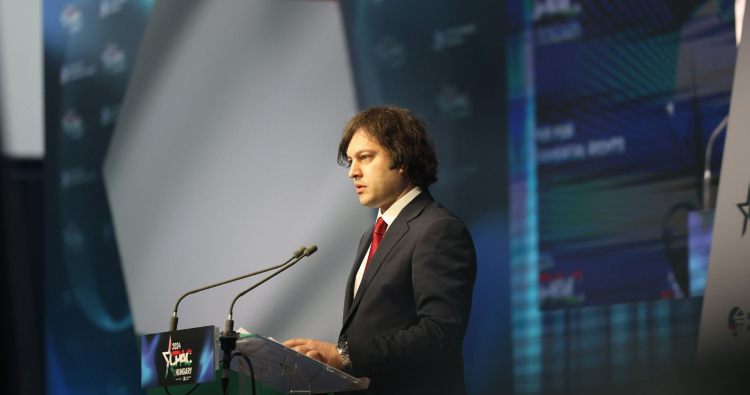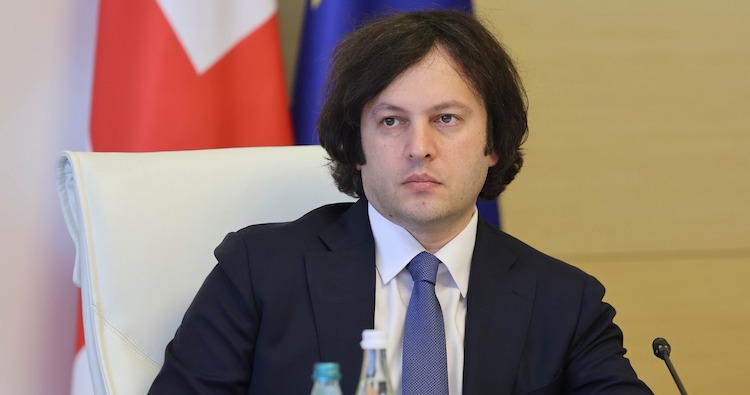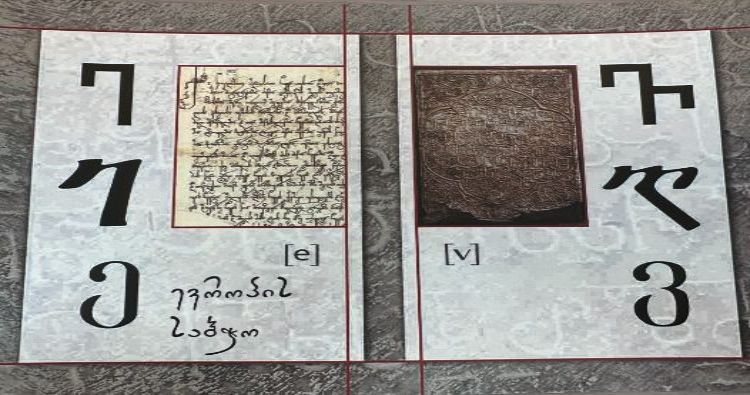Georgian PM tells conservative conference “homeland, language, faith” “main pillars” of national identity

Kobakhidze said Georgia’s current challenges were similar to those the country had faced for centuries, with these challenges having spread globally “posing risks to both the smallest and the largest countries and nations”, and noted “so-called liberals” were “putting at risk” the identity of countries and nations around the world. Photo: Government Administration
Georgian Prime Minister Irakli Kobakhidze on Thursday told the opening session of the Conservative Political Action Conference, an annual event hosted this year in Budapest, Hungary, that “homeland, language and faith” were the “three main pillars” forming Georgia’s “national identity” since the country declared Christianity as the state religion in the fourth century CE.
Kobakhidze told the event the nation had “fought and sacrificed” itself to “protect their homeland for centuries”.
Historically, our small but freedom-loving and proud country had to exist at the crossroads of empires. For centuries, Georgians fought and sacrificed themselves to protect their homeland, their cherished land. For generations, Georgians have steadfastly preserved their language”, he said.
The PM said in 1978 “our parents' generation stood firmly” during the public protests in the country’s capital Tbilisi that forced Soviet authorities to abandon plans to strip Georgian of the status of the state language, and noted people's principles “triumphed”, forcing the Soviet authorities to retreat.
We - Georgians - had to fight for centuries to protect our faith and religion, Christianity. Our history has taught us that any occupation of a country is temporary, if the conqueror fails to destroy the identity of the people. Therefore, all conquerors had as their first task an attack on the religion of the Georgian people”, he noted.
Last of all, this was attempted by the Soviet Bolsheviks, who destroyed churches and forbade believers to pray. However, Georgia won all battles fought for faith and was able to protect and preserve Christianity”, he added.
Kobakhidze said Georgia’s current challenges were similar to those the country had faced for centuries, with these challenges having spread globally “posing risks to both the smallest and the largest countries and nations”, and noted “so-called liberals” were “putting at risk” the identity of countries and nations around the world.
He said these “risks” were “highest” in Europe and the United States, where the “so-called liberal ideology” had the “most widespread roots”.
The PM claimed “uncontrolled migration” possessed the “greatest threat to national identity” of European countries, and added if current processes continued “local populations in many European countries” would “very soon be a minority”.
The so-called liberals fight against Christianity with particular enthusiasm. The only difference between the so-called liberals and the Bolsheviks is that the latter used sledgehammer as their main weapon in the fight against religion, while the liberals fight against Christianity with propaganda, which, under the conditions of total control of the media, has much stronger power than the sledgehammer”, he said.
Today, the Georgian Orthodox Church is a prime target of their attack in Georgia”, the Government head told the Conference, claiming the “so-called liberals” were “trying to change the concept of national identity of the country” and “removing religion, faith from the trinity” by “replacing the words ‘homeland, language and faith’ with the words ‘homeland, language and unity’”.
He also claimed the “theory” of the unspecified groups also “states that an individual should not have a distinct identity, nor should a nation or a country”, while also alleging the ideas also included “absence of moral limits in an individual's private life”. He told the event this “propaganda” had “disturbing consequences” in both Europe and the US.
The Georgian PM also claimed sociological studies in the US and “most European countries” “confirmed” that about 20 percent of the populations aged between 18-25 “declare themselves as representatives of LGBT community”, adding the figure was “three times lower” among people aged 26-32, and used the figures to allege the “propaganda” had “tripled the number of LGBT individuals in seven years”.
 Tweet
Tweet  Share
Share



